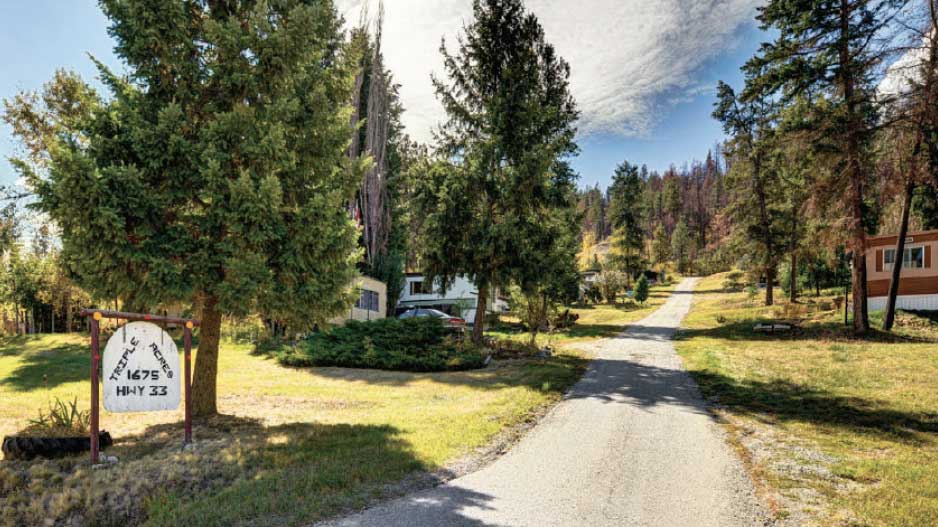View original article on www.biv.com
Manufactured home parks deliver affordable housing option.

This 15-pad manufactured home park in Rock Creek in the South Okanagan is listed at $549,000, which is less than the average price of a Vancouver condo apartment | Klein Group
Perry Peace, a multi-family apartment landlord in Regina, placed a simple ad in Western Investor last month that read: “Private investor wanting to purchase mobile home park in B.C. or Alberta.”
Peace is representative of what has always been a major profile among manufactured home park buyers.
“I want to retire, and I don’t want to be too far north,” Peace said, noting that it was minus 35 degrees in Regina as he spoke to Business in Vancouver in February.
The fact he is advertising to find listings reveals another trend: a shortage of manufactured home parks in B.C. after many have been sold as redevelopment plays.
Peace has about $2 million to invest in a park, and a scout through the recent listings found a number that would likely fit the bill.
They include a 12-site park near Salmon Arm in the Okanagan, fully occupied and priced at $549,000 and returning 6.5% annually, representing an annual net income of about $36,000; and a 12-unit mobile home park with six rental cottages in the South Okanagan, priced at $1.62 million, both listed by veteran park dealer Vadim Kobasew of Re/Max Commercial in Penticton.
Eugen Klein of the Klein Group has a 15-pad park in Rock Creek in the South Okanagan listed at $549,000, throwing a 9.1% capitalization rate.
“An ideal retirement home,” Klein suggested. “Demand for cash-flow properties outside of the Lower Mainland continues to increase since the implementation of speculative and foreign taxes in B.C.”
Capitalization rates have moved upwards in the last 12 months, but modestly, with the introduction of higher stress tests in lending.
Manufactured home sales in B.C. soared to $91.6 million in 2018, up from $33.6 million in 2017, with the number of sales rising to 27 properties in 2018 compared with 22 the previous year.
Kobasew said demographics are coming into play on both sides of transactions.
On one hand, longtime owners are selling parks and retiring with their capital, while buyers are often mature investors who see the manufactured home parks as a future retirement investment. For instance, it is possible for rental investors to buy a 12-pad to 15-pad manufactured home park in rural B.C. for around $600,000, which is the average cost of a Vancouver condominium apartment.
Manufactured home pads rent to tenants for between $350 to $500 per month in B.C.’s Interior and northern Vancouver Island. Rents are allowed to increase 2.5% this year under B.C.’s Residential Tenancy Act.
Many manufactured park owners are remote investors who hire a manager and may visit the site only once or twice a year, Kobasew said.
Like B.C.’s overall residential market, action in manufactured parks has “adjusted” recently, he added.
“Buyers are taking longer to make decisions; it’s not like it was two or three years ago when we had competing offers and sales over list price. If the park doesn’t meet the buyer’s ideal parameters, they are more likely to pass on the opportunity than they would have [been] a couple of years ago.”
Kobasew added that financing can be a challenge for nascent investors.
He said the minimum down payment is 25% and ideally should be higher if the buyer does not have a track record in the industry.
Kobasew recommended dealing with local credit unions, which he said are more tuned to the real estate market in their community.
Deep-pocket investors, including pension funds and real estate investment trusts, are also in the market, but looking for large parks close to major centres or multi-park portfolios. An example is Canadian Apartment Properties Real Estate Investment Trust, which now owns a manufactured home park on B.C.’s Sunshine Coast and seven other parks across Western Canada.